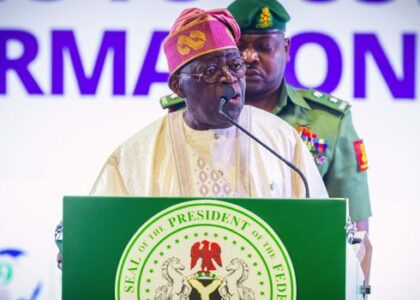By Paul Ejime*
As it struggles with the consequences of its poor handling of the rash of military coups in the West African region, the leadership of the Economic Community of West African States (ECOWAS) appears to have run out of ideas and creativity in the search for an effective solution.
By their decision to use military force to restore constitutional order in Niger following the army takeover of government in that country on 26 July 2023, and the sweeping sanctions imposed on coup plotters in Mali, Guinea, Burkina Faso and Niger, including travel and flight bans, ECOWAS leaders should have known that they were on slippery grounds.
In its 50 years of existence, the regional bloc is better known for acquitting itself credibly in conflict prevention, management, and resolution, especially ending the civil wars in Liberia and Sierra Leone and effectively restoring constitutional order in member States after military coups.
While Article 45 of the Supplementary Protocol on Democracy and Good Governance 2001 permits the Mediation and Security Council to apply measures including sanctions in the event of an unconstitutional change of government, the Authority of Heads of State and Government had always maintained a principled stance in deploying a combination of tools/strategies – diplomacy and tough decisions, where necessary, in tackling conflicts.
Article 45.1 states: “In the event that democracy is abruptly brought to an end by any means or where there is massive violation of Human Rights in a member State, ECOWAS may impose sanctions on the State concerned.”
45.2. explains: “The sanctions which shall be decided by the Authority may take the following forms, in increasing order of severity:
• Refusal to support the candidates presented by the member State concerned for elective posts in international organisations
• Refusal to organise ECOWAS meetings in the Member State concerned
• Suspension of the member State concerned from all ECOWAS decision-making bodies. During the period of the suspension, the member State concerned shall be obliged to pay its dues for the period.
45.3. During the period of suspension, ECOWAS shall continue to monitor, encourage and support the efforts being made by the suspended member State to return to normalcy and constitutional order.
45.4. On the recommendation of the Mediation and Security Council, a decision may be taken at the appropriate time to proceed as stipulated in Article 45 of the Protocol Relating to the Mechanism for Conflict Prevention, Management, Resolution, Peace-Keeping and Security 1999.
On Restoration of Political Authority, this Article stipulates: “In situations where the authority of government is absent or has been seriously eroded, ECOWAS shall support processes towards the restoration of political authority. Such support may include the preparation, organisation, monitoring and management of the electoral process, with the cooperation of relevant regional and international organisations. The restoration of political authority shall be undertaken at the same time as the development of respect for human rights, enhancement of the rule of law and the judiciary.”
It should be noted that ECOWAS’ military interventions in Liberia and Sierra Leone, through its Ceasefire Monitoring Group, ECOMOG, in the 1990s, were under different circumstances and at the behest of the beleaguered governments. Also, in 2016/2017, the deployment of Nigerian air assets and the preparation by Senegalese troops to march on the Gambia only followed the uncompromising position of then-President Yahya Jammeh, who rejected ECOWAS’ mediation, claiming victory in the December 2016 election, which he lost. In the end, Jammeh was exiled to Equatorial Guinea without any military confrontations.
Also, under the 1999 and 2001 Protocols, there are provisions for the deployment of good office missions, including military chiefs, Council of the Wise/Elders or appointment of a Chief Mediator. But ECOWAS leaders did not exhaust these non-kinetic alternatives before going for an aborted military option in Niger. Also, the imposition of travel and flight bans effectively foreclosed the possibility of interactions or negotiations with the coup leaders.
Similarly, Nigeria’s cut of electricity supply to Niger did not derive from any ECOWAS instruments.
Article 52 of the 1999 Protocol states that: “In accordance with Chapters VII and VIII of the United Nations Charter, ECOWAS shall inform the United Nations of any military intervention undertaken in pursuit of the objectives of this Mechanism,” but this was not the case on Niger.
The embarrassment from an unprecedented and unpopular decision for kinetic option in Niger, which fell through, has forced ECOWAS leaders into an uncomfortable situation, and their bending over backwards to placate the junta leaders – a strategy fraught with potential uncertainties and unsavoury consequences.
Most critically, the implementation of some decisions taken by the ECOWAS Council of Ministers at its extraordinary meeting in Accra, Ghana 22-23 May 2025, on the contingency arrangements for the departure of Mali, Burkina Faso, and Niger (known as the Alliance of Sahel States, AES, could damage the integrity, unity and cohesion of the regional bloc irreparably, and hasten its further disintegration.
Article 91 of the ECOWAS Revised Treaty 1993 is unambiguous on the withdrawal of any member state from ECOWAS. Article 91.1 states clearly: “Any member State wishing to withdraw from the Community shall give to the Executive Secretary (President of the Commission) one year’s notice in writing… At the expiration of this period, if such notice is not withdrawn, such a State shall cease to be a member of the Community.
91.2. During the period of one year… such a member State shall continue to comply with the provisions of this Treaty and shall remain bound to discharge its obligations under this Treaty.”
ECOWAS rules do not provide for “group withdrawal,” and following the precedent with Mauritania’s withdrawal in 2000, there was no need for the ECOWAS Council of Ministers to reinvent the wheel, the way it did in Accra.
The junta leaders announced their countries’ withdrawal from ECOWAS “with immediate effect” in January 2024.
However, under the 1993 treaty, that withdrawal only became effective by January 2025, and acting on humanitarian grounds, ECOWAS granted its staff from the AES countries until September 2025 to leave with an additional three months’ pay until December 2025.
Yet, the Council at its Accra meeting decided to:
a. ”adopt a two-phase disengagement process for the affected staff. The first phase will involve staff in Senior Professional positions… and all G-Staff from the three countries that are working at ECOWAS institutions to be relocated and will take effect at the end of September, based on termination letters already sent to the staff concerned. The (ECOWAS), Commission is given until the end of December 2025 to recruit staff to fill the resulting vacant positions. The second phase will involve P4 Staff and below and will be carried out on a case-by-case basis, taking into account the specific circumstances of the staff concerned, including age and the priority needs of the institutions.”
“On regional market and economic integration, the Council underscored that Free Movement and Economic matters are at the core of regional integration and deserve particular attention in discussing separation modalities with the exiting countries.
In a needless move to accommodate the AES countries, “(The) Council noted the existence of various legal frameworks which are the foundation of regional economic integration and directly affect Community citizens… stressed the need to ensure a collective approach to negotiations as a regional bloc based on existing regional instruments such as the Protocol on free movement of persons, the ECOWAS Trade Liberalisation Scheme and the Common External Tariff.”
Additionally, while it “reiterates the clarity, in the relevant provisions of the ECOWAS staff Regulations, that only nationals of ECOWAS member States are eligible for employment as staff members,” the Council still called for a “Review of the Staff Regulations to reflect current circumstances.”
The Council further authorised the ECOWAS Bank for Investment and Development (EBID), ”to continue with its commitments under ongoing projects in Burkina Faso, Mali and Niger. Still, the Council decided that EBID disengage with staff from the three Countries.”
To many analysts, these concessions are not only too many, but unwarranted and may come back to haunt ECOWAS and its aspirations for regional integration. The junta leaders have been unrepentant in denouncing ECOWAS and all that it stands for while portraying themselves as populist power grabbers determined to perpetuate themselves in the saddle.
ECOWAS should assert itself as a rule-based organisation.
However, its dilemma is that for the past 10 to 12 years, the bloc has ignored or tolerated “constitutional and electoral coups, and human rights violations” by some of its leaders in blatant breach of its own rules. There are also some fifth columnists within, working against ECOWAS.
The Constitutional Convergence Principles under Article 1 of the 2001 Protocol stress among others:
– Separation of powers by the Executive, Legislative and Judiciary.
– Empowerment and strengthening of parliaments and guarantee of parliamentary immunity.
– Independence of the Judiciary.
– Every accession to power must be made through free, fair and transparent elections.
– Zero tolerance for power obtained or maintained by unconstitutional means, and,
– Popular participation in decision-making, strict adherence to democratic principles and decentralisation of power at all levels of governance.
Yet, in their inordinate quest to obtain or retain power at all costs, some ECOWAS leaders have trampled on the regional principles, while the Authority of Heads of State has rendered dormant or ineffectual the ECOWAS Commission and its management, which are supposed to coordinate the programmes and activities of the regional institutions.
As ECOWAS celebrates the 50th anniversary of its formation through the 28th May 1975 Treaty of Lagos, its drastic problems require drastic solutions.
For a start, the ECOWAS Commission should undertake an urgent and transparent recruitment exercise to fill any vacant positions from the teeming army of qualified professionals among the 400 million community citizens and release staff from countries whose leaders despise the regional bloc.
Since the proud junta leaders believe that their landlocked poor countries are self-sufficient, ECOWAS should not reward their arrogance.
To regain its past glory, navigate emerging threats and bequeath an enduring legacy to the next generations, ECOWAS leaders at national and regional levels must change tact and lead by example with vision and dynamism, beginning with effective management of the lingering threats in member States such as Togo, Guinea Bissau, Sierra Leone, The Gambia and Cote d’Ivoire.
*Paul Ejime is a Media/Communications Specialist and Global Affairs Analyst







